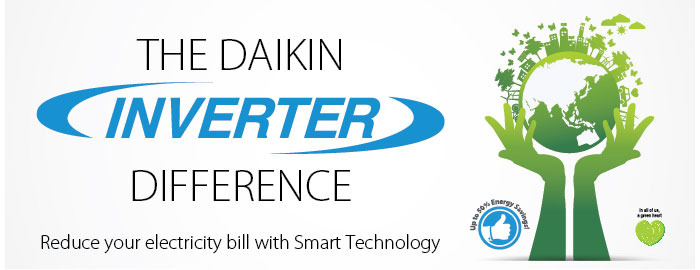Daikin’s commitment to develop sustainable systems with a lower impact on the environment
 Other News
Other News Subscribe to newsletter
Subscribe to newsletter
| 20 Nov 2017 |
As the world prepares to install 1.6 billion AC units by 2050, Daikin, the Japanese manufacturer and global leader in the development, manufacturing and installation of HVAC and Refrigerants, has pioneered a solution that can save billions of tonnes of C0₂ globally.
Across the world, 1.6 billion new AC units will be installed to 2050, according to figures published by Lawrence Berkeley National Laboratory. In terms of increased carbon emissions it is the equivalent of creating several new countries, and has prompted experts to call for minimum advances in energy efficiency of 30% per unit, in order to save 98 billion tonnes of C0₂ globally.

Leading the way, Daikin has pioneered the new Inverter Split Wall Mounted unit – the most energy efficient air conditioner of its type available in the GCC. The split Inverter can achieve energy reductions of up to 70%, compared to traditional split AC and window units, and boasts an Energy Efficiency Ratio (EER) of 13.3 at T1 condition, making it the most energy efficient air conditioner of its type in the market.
The result of continued research on refrigerants, R-32 is a next generation gas that addresses a range of environmental considerations in a balanced manner. The Split Inverter features bespoke design for the High Ambient GCC market, and is testament to Daikin’s commitment to develop sustainable systems with a lower impact on the environment.
Daikin MEA Product Planning Manager, Sana Hamdani commented: “Combining the power of Daikin’s inverters with the revolutionary R-32 refrigerant and our Intelligent Eye motion sensor technology, this Inverter has been designed for optimum nominal and seasonal energy efficiency, in line with real life operating conditions in the Middle East, underlining Daikin’s serious commitment to the environment.
“The Inverter AC constantly adjusts the compressor speed to precisely maintain the desired temperature, and contributes on reducing the energy consumption all year round, for a lower electricity bill. The Smart technology utilizes an intelligent advanced control that regulates precisely the compressor speed to constantly adjust delivered capacity to meet the desired room temperature. It also provides powerful cooling, quieter operation and an extended product lifetime.”
By using R-32 refrigerant, Daikin inverter AC is able to maximize energy efficiency while minimizing the global warming impact with zero ozone depletion potential and up to 80% less CO2 emission. than R-410A.
Installed in new systems or retrofitted to existing systems, the Split Inverter combines the power of the Daikin inverter swing compressor – designed and patented by Daikin – and the R-32 refrigerant, for an energy bill reduction of 30 – 70% and lower use of refrigerants.
Across the GCC, infrastructure development projects, in addition to a steep rise in residential and indoor leisure projects, currently drive demand for new AC units, with the regional market projected to grow at a CAGR of 7.3% during 2017-2023.
But this high pace of growth has increased C0₂ emissions. According to findings from the UN, total emissions in the Arab region doubled between 1991 and 2008 with Saudi Arabia, the UAE and Egypt leading contributions.
In terms of C0₂ emissions per capita in the GCC, these had reduced significant after 2010 but remain higher than the global average, with an average up to 30 metric tonnes in Kuwait against 19.8 tonnes in U.S.
Daikin MEA General Manager, Tuna Gulenc, added: “As a part of our environmental commitment to society, we believe it is manufacturer’s duty to advise the market and develop sustainable solutions that have practical applications to reduce energy consumption and CO₂ emissions. People in Japan, Europe, China, Australia and other countries, already enjoy the benefits of Inverter technology and here at Daikin MEA, we believe the Middle East will soon follow suit. The use of Inverter technology in HVAC units helps each citizen to contribute to the regional efforts to reduce environmental impact.
“In line with the evolving directives and strategies on sustainability as a core theme for future developments in the GCC, Daikin is committed at developing and introducing state of the art products and solutions, specifically designed for the region, achieving highest efficiencies, performances, and reliabilities. To put it simply, Daikin has set a new standard in the HVAC Industry.”




